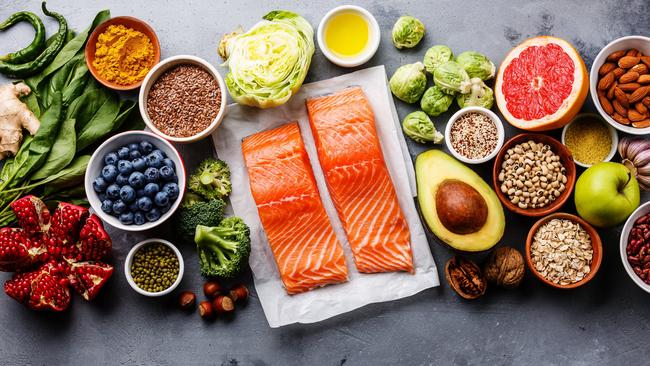Change your gut health now: New CSIRO diet secrets revealed
In an edited extract from the CSIRO’s new Gut Care Guide we take a look at the incredible role your gastrointestinal tract plays in overall health and well-being at every stage in your life.

News
Don't miss out on the headlines from News. Followed categories will be added to My News.
As well as being an organ of digestion and nutrient absorption, the gastrointestinal tract serves as a physical and biochemical interface between our internal and external environments.
This vital nexus is known as the gut barrier.
How the gut changes as we travel through life
There is growing recognition that as we travel through life, diet – in particular the macronutrients we consume – has a major role in shaping the health of our gut.
Our gut health is also strongly influenced by environmental factors and lifestyle choices.

Birth
How a baby is born is the first major contributor to its gut microbiome. Babies born naturally are first colonised by microbes from their mother’s birth canal, and often the mother’s faecal microbiome, as well as through her mammary glands during breastfeeding, along with microbes present on the mother’s skin and mouth, and in the immediate environment.
Studies have shown that babies born by caesarean section have a less diverse gut microbiome in early infancy, compared to those delivered vaginally, and this can increase their susceptibility to infections and gut issues.
This has led to a practice known as vaginal seeding, where babies born by C-section are swabbed with a sample of their mother’s vaginal microbiome.
While vaginal seeding has been shown to help support the development of the microbiome in the short-term, the long-term effects are unknown.

Infancy
During the first months of life, newborns are vulnerable to disease, as their immune system has not developed, and the mucosal lining, or epithelium, in their small intestine is anatomically and functionally immature.
Their gut barrier isn’t fully formed, making it more open, or “permeable”, and allows more things to pass through it.
During infancy, this gut permeability can have beneficial effects, such as enhanced uptake of nutrients. However, it also leaves the body more susceptible to microbes and foreign particles, leading to infection and inflammation.
It is likely that growth factors, hormones, breast milk and the composition of the gut microbiome all facilitate growth of the gut.
During the first year of life, milk (especially breastmilk) is considered the optimal food source for growing infants.
The gradual introduction of a wide range of foods during weaning promotes a shift in the gut microbiome towards that seen in healthy adults.
Other environmental factors, plus exposure to antibiotics and infection, also play a major role in determining the distinctive characteristics of the microbial community in an infant’s gut.
In general, over the first two years of life, an infant’s gut microbiome begins to resemble that of an adult’s. By the time infants are about two-and-a-half to four years of age, their gut microbiome has fully matured.
Developing a stable core of diverse gut microbiome species early in life is critical and advantageous for maintaining health.

Adulthood
Maintaining a diverse gut microbiome is positively correlated with good gut health. Microbiome diversity can be temporarily affected by changes in diet, sickness and other lifestyle factors during adulthood (see sidebar).
Mature age
In our later years, the composition of the gut microbiome often becomes less diverse, and gut “leakiness” may increase.
Lifestyle factors, including diet and exercise, as well as genetic and environmental factors (pollutants, poor sanitation), may all contribute to the decline in diversity of our gut microbiome. Extended use of antibiotics can also have a detrimental impact on the composition of the gut microbiome.
As we advance in age, we are at greater risk of disorders such as irritable bowel syndrome, inflammatory bowel diseases, coeliac disease and colorectal cancer – these are often linked with shifts in our gut microbiome.

Ethnicity and country of birth
Our genetics and ethnic background, country of birth and where we’ve spent time living, as well as our socio-economic status, may influence the microbes and functioning of our gut. Cultural differences – especially in the type and variety of foods consumed – can influence our microbe populations and their activities. How these microbe populations become entrenched by long-term dietary patterns is still unclear.
Our genetics and ethnic origins can influence our ability to digest or metabolise foods. For example, it is quite common for people in some Asian countries to find it more difficult to break down alcohol, because they have inherited a deficiency in an enzyme involved in the process.
Similarly, after weaning, many people lack the ability to efficiently break down lactose, a sugar found in milk from cows, goats, sheep and camels.
This can cause significant gut discomfort, and is more prevalent in people from Africa, Asia and South America.
Many people in countries such as Australia consume typical Western diets, high in saturated fats, protein, and foods with added sugars and salt, while lacking the dietary fibres and other beneficial compounds found in plant foods, needed to maintain good digestive health.
This is an edited extract from The CSIRO Gut Care Guide by Michael Conlon, Pennie Taylor, Dr Cuong D Tran and Megal Rebuli, Pan Macmillan, $40, out Tuesday.
More Coverage
Originally published as Change your gut health now: New CSIRO diet secrets revealed




